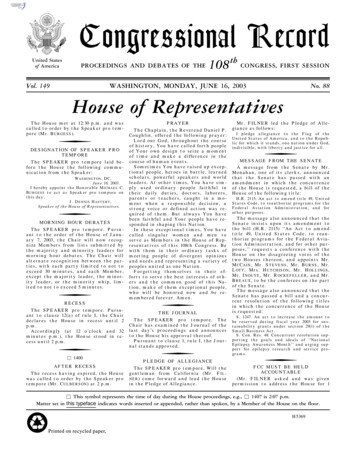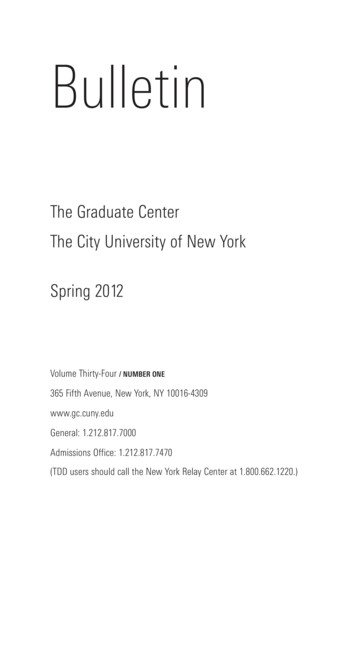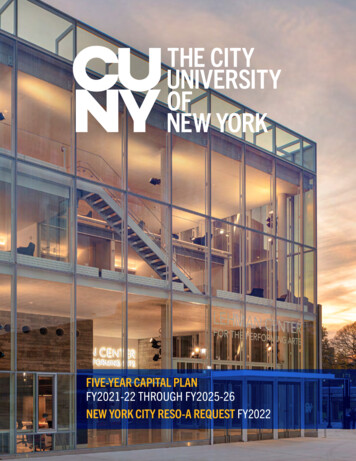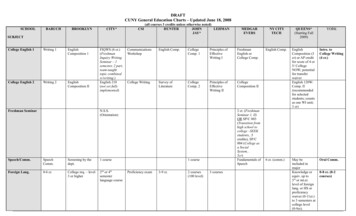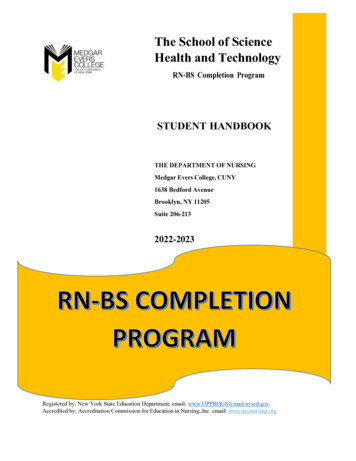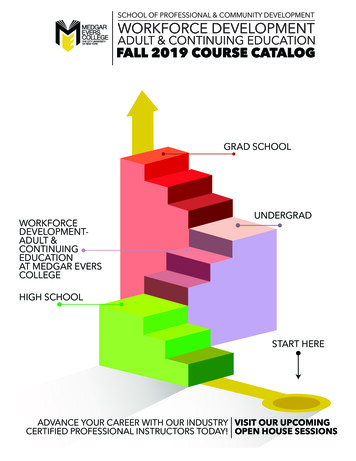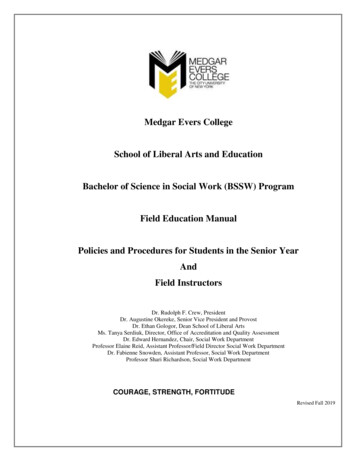
Transcription
Medgar Evers CollegeSchool of Liberal Arts and EducationBachelor of Science in Social Work (BSSW) ProgramField Education ManualPolicies and Procedures for Students in the Senior YearAndField InstructorsDr. Rudolph F. Crew, PresidentDr. Augustine Okereke, Senior Vice President and ProvostDr. Ethan Gologor, Dean School of Liberal ArtsMs. Tanya Serdiuk, Director, Office of Accreditation and Quality AssessmentDr. Edward Hernandez, Chair, Social Work DepartmentProfessor Elaine Reid, Assistant Professor/Field Director Social Work DepartmentDr. Fabienne Snowden, Assistant Professor, Social Work DepartmentProfessor Shari Richardson, Social Work DepartmentCOURAGE, STRENGTH, FORTITUDERevised Fall 2019
Table of ContentsWelcome Letter and Introduction to Field PlacementPrefaceSocial Work Advisory Committee456Section I. IntroductionMedgar Evers College of the City University of New York Mission StatementMedgar Evers College School of Liberal Arts Mission Statement888Section II. Medgar Evers College Social Work Mission, Philosophy and GoalsSocial Work MissionSocial Work Program PhilosophySocial Work Program CurriculumSocial Work Program’s Conception of Generalist Social Work PracticeSocial Work Program GoalsSocial Work Program Objectives999991111Section III Goal of Field EducationGoal of Field EducationField Education ObjectivesCSWE Expected Educational Competencies for Social WorkLinkage between Program Objectives and Course Learning Outcomes / (SLOs)1313131515Section IV. Student Application Process for Field Instruction and Admission RequirementsCriteria for Admission to Field EducationField Application ProcessField Education Opportunities74747576Section V. Field Agency Placement of Social Work StudentsStudent Responsibilities in the Fieldwork AgencyGuidelines for Home and Community VisitsPolicy and Academic IntegrityStudent Violation of Standard of Conduct in Field Work SitesGrievance Appeal Process for Suspension or Removal for Violating Standards of ConductSteps in the Academic Grievance Process78787979808080Section VI. Field Agency Selection CriteriaPolicy Regarding Field Instruction in Student’s Place of EmploymentSelection of Field Instructor828385Section VII. Role and Responsibilities of the Agency Field InstructorRole and Responsibilities of Field InstructorSupervision of the Social Work Student868686Section VIII. Role and Responsibilities of the Social Work Field Education Director88Section IX. Field Practicum Course Descriptions, Guidelines and EvaluationSW 420 Field Practicum 1SW 421 Field Practicum II Senior Capstone Course898989Section X. Assessment of the Social Work Student Field Education ExperienceOrientation and Field Instruction Training for Field InstructorsField Instruction EvaluationEvaluation of Student Field PerformanceEvaluation of Field Placement9090909092
Appendices – Table of ContentsI. Medgar Evers College Institutional Core Values94II. Medgar Evers College Policy in Regard to Student Conduct (Excerpted from The MedgarEvers College Catalog 2016-2018)Student ConductStudents' RightsAccess to College FilesSexual Harassment PolicyComplaint ProceduresRules and Regulations for the Maintenance of Public Order Pursuant to Article 129A of the EducationLaw of the state of New York (“Henderson Rules”)Section 15.3:Student Disciplinary ProceduresSection 15.4 Appeals ProcedureSection 16.3: Student Government Fee959596979999100104105107III. National Association of Social Workers (NASW) Code of EthicsOverviewPurpose of the NASW Code of EthicsEthical StandardsSocial Workers’ Ethical Responsibilities to ClientsPrivacy and ConfidentialitySocial Workers' Ethical Responsibilities to ColleaguesSocial Workers' Ethical Responsibilities in Practice SettingsSocial Workers' Ethical Responsibilities as ProfessionalsSocial Workers' Ethical Responsibilities to the Social Work ProfessionSocial Workers' Ethical Responsibilities to the Broader Society109109110112113114117119121122124IV. NASW Social Work Student Professional Liability Insurance FAQs125V. National Association of Black Social Workers (NABSW) Code of Ethics126Appendix VI. Application For Field PlacementAppendix VII. Release of Information FormAppendix VIII. Agency Affiliation Agreement127131132Appendix IX. Agency ProfileAppendix X. Initial Field Visit ChecklistAppendix XI Student’s Field EvaluationAppendix XII. Evaluation of Field Placement and Field Instructor136139140148Appendix XIII. Program Evaluation (Generalist Practice)Appendix XIV. Sample Supervision AgendaAppendix XV. Student’s Field Practicum TimesheetAppendix XVI. Sample Journal EntryAppendix XVII. Sample Process RecordingAppendix XVIII. Field Practicum Learning Contract SW 420 and SW 421Appendix XIX College Resources152155157159160162169
Letter to BSSW Students in the Senior YearWe are pleased and excited to be working with you as you advance towards final completion of yourBSSW degree. Congratulations on your success and on completion of the work which you have donethus far.You are receiving this Field Education Manual because you have met the requirements to enter the finalphase of this BSSW program. Under the guidance of your Field Instructor and your faculty adviser, youwill engage in Fieldwork. This phase offers opportunities to draw upon classroom study, theoreticalapproaches and knowledge in developing competencies, skills and professional identity in a fieldworksetting.Fieldwork educational experience further enables you to develop the skills that are necessary to preparefor a career in social work helps you to gain insights into how an agency functions, and to acquire theknowledge and skills to become a change agent on the road to becoming a competent generalist socialwork practitioner.We hope that as you move forward in your field education experience, you will use this Manual as yourguide to understand the requirements for the BSSW degree at Medgar Evers College. If you havequestions about any aspects of the program, the Manual, or about your educational pursuits, please donot hesitate to inquire. Your faculty adviser or any of the Social Work faculty will be pleased to assistyou. If you have suggestions to offer about the Manual or the BSSW program, please share yourthoughts and ideas with us.Again, congratulations on this important milestone. We look forward to assisting you in reaching yourgoal and completing the program.Sincerely,Edward HernandezEdward Hernandez, Ph.D.ChairEda F. Harris-Hastick, Ed.D., LCSWProfessorElaine Reid, LCSW-RAssistant Professor/Field Education DirectorFabienne SnowdenFabienne Snowden, Ph.D.Assistant Professor/Field Education CoordinatorMedgar Evers College/CUNYBSSW Program Field Education ManualPrefacep. 4
PrefaceThis Manual provides guidance to Medgar Evers College (MEC) of The City University of New York(CUNY) students in their final year as well as to inform Field Instructors and supervisors regarding theirresponsibilities in support of the BSSW goals and objectives. It outlines the basic policies andprocedures of the field internship component of the Bachelor of Science in Social Work (BSSW)Program, in the Social Work Department, (MEC) of The City University of New York (CUNY).This manual serves as a guide for students and field instructors of their respective responsibilities in thefield experience. The manual will be updated annually. Therefore, we welcome feedback forimprovement from students and field instructors.The faculty of the Bachelor of Science in Social Work (BSSW) Program and the Dean of the School ofLiberal Arts and Education are aware of the tremendous investment in time, energy, and resources bythe field agencies in providing Field Instruction for our students. We would like to extend ourappreciation to you for partnering with us.Medgar Evers College/CUNYBSSW Program Field Education ManualPrefacep. 5
BACHELOR OF SCIENCE IN SOCIAL WORK (BSSW) PROGRAMADVISORY COMMITTEENameMcQueen, John , LCSW-RCo-Chair, BSSW Advisory CouncilOrganization/TitleFamily Renaissance/CEOHeidi Gersh RosnerAdministration for Children’s Services (ACS)Banks, Velma D., MSWCEO/Resource Counselor, Banks EnterpriseCobb, Akosua , LCSWMedgar Evers College - CUNYBSSW ProgramCummings, Christiana, Ph.D.Administration for Children’s Services (ACS) SeniorAdvisor for Child Welfare Policy & Planning, Div. of PolicyPlanning & MeasurementGriffith, Ismay,LCSW, MA, SociologyCaribbean American Social Workers Association(CASWA):NYC Administration for Children’s Services (ACS)Harris-Hastick, EdaMSW, LCSW, Ed.D.Medgar Evers College – CUNYBSSW ProgramHernandez, MichaelMSW, LCSWNYC Administration of Children’s Services (ACS)/ManagerJohnson, Tracy, MSWAdministration for Children’s Services (ACS)Lazerus, June, MSWNYC Office of Alcohol & Substance Abuse Services/OASASJones, Gale, ReverendPastor, Long Island Community FellowshipJones, Richard, MSWMedgar Evers-Exec. Dean of Accreditation & QualityAssuranceLuangphaxay, Joy, LMSWNew York Coalition for Asian Mental Health, ProgramDirectorMatthews, LearMSW, DSWSUNY Empire State College/ProfessorMiller, Madelyn, LCSW-R,PhDMoses, Ngozi, M. SciDisaster Trauma Committee, NYC Chapter NASW/ChairpersonBrooklyn Perinatal Network, Executive DirectorMedgar Evers College/CUNYBSSW Program Field Education ManualBSSW Advisory Committeep. 6
Niaz, Robina, MSWTurning Point Battered Women’s ShelterFounder and Executive DirectorNicholas, Joyce, LCSW-RColumbia University- School for Social WorkPhifer, Anthony, B.A.Medgar Evers CollegeRose, Lisa, DSWBMCC/CUNY, Human Services/ProfessorSchachter, Robert, DSWExecutive Director, NYC Chapter, National Association ofSocial Workers (NASW)Wallach, Jeff, MSW, LCSWKings County Hospital/Director of Social Work DepartmentMedgar Evers College/CUNYBSSW Program Field Education ManualBSSW Advisory Committeep. 7
SECTION I. INTRODUCTIONMedgar Evers College of The City University of New York Mission StatementMedgar Evers College was founded as a result of collaborative efforts by community leaders,elected officials, the Chancellor, and the Board of Trustees of The City University of New York.The College, named for the late civil rights leader, Medgar Wiley Evers (1925-1963), wasestablished in 1970 with a mandate to meet the educational and social needs of the CentralBrooklyn community. The College is committed to the fulfillment of this mandate.In keeping with the philosophy of The City University and Medgar Evers College, we believethat education has the power to positively transform the lives of individuals and is the right of allindividuals in the pursuit of self-actualization. Consequently, the College's mission is to developand maintain high quality, professional, career-oriented undergraduate degree programs in thecontext of liberal education. The College offers programs both at the baccalaureate and at theassociate degree levels, giving close attention to the articulation between the two-year and thefour-year programs.The College has a commitment to students who desire self-improvement, a sound education, anopportunity to develop a personal value system, and an opportunity to gain maximum benefitsfrom life experience and from their environment.School of Liberal Arts Mission StatementThe mission of the School of Liberal Arts (SLA) is to prepare students to achieve their academicand career goals, immerse them within a learning community characterized by engagement witha rich and diverse liberal arts curriculum, and to cultivate scholarly excellence, culturalawareness, and social responsibility. The mission of the School aligns with the College’smission and commitment to the belief that an inclusive liberal arts education is a necessaryfoundation for ongoing intellectual development, professional studies, and effective service tothe community.Medgar Evers College/CUNYBSSW Program Field Education ManualSection I: Introductionp. 8
SECTION II. BACHELOR OF SCIENCE IN SOCIAL WORK (BSSW) PROGRAMMISSION, PHILOSOPHY, GOALS, AND OBJECTIVESBSSW Program MissionThe mission of the BSSW Program is to “prepare students at the baccalaureate level for entryinto generalist social work practice with individuals, families, groups, communities andorganizations, as well as for continued study at the graduate level.”BSSW Program Philosophy“We believe that we can work together to create such an environment of learning that our socialwork students become conscious of their identities, roles, and responsibilities in society and areinspired to become change agents, seeking to facilitate the empowerment of others as theygrapple with oppression and injustice.”BSSW CurriculumThe BSSW curriculum builds on a solid liberal arts foundation and provides a challenginggeneralist curriculum. The BSSW program prepares students for generalist social work practice.The program incorporates courses that focus on field education, policies and services, research,social work practice, diversity, populations-at-risk and social and economic justice, and humanbehavior in the social environment. All courses are aligned to comply with the standards forsocial work education as defined by the Council on Social Work Education (CSWE)Commission on Accreditation.BSSW Program’s Conception of Generalist Social Work PracticeThe Bachelor of Science in Social Work (BSSW) defines its concept of generalist social workpractice using a framework that integrates proficiency in the knowledge, ethics, values and skillsof the social work profession as defined by CSWE.The BSSW program utilizes the Association of Baccalaureate Social Work Program Directors(BPD) definition of generalist social work practice which is as follows:Medgar Evers College/CUNYBSSW Program Field Education Manualp. 9
Generalist social work practitioners work with individuals, families, groups, communitiesand organizations in a variety of social work and host settings. Generalist practitionersview clients and client systems from a strengths perspective in order to recognize, support,and build upon the innate capabilities of all human beings. They use a professionalproblem-solving process to engage, assess, broker services, advocate, counsel, educate,and organize with and on behalf of client and client systems. In addition, generalistpractitioners engage in community and organizational development. Finally, generalistpractitioners evaluate service outcomes in order to continually improve the provision andquality of services most appropriate to client needs.Generalist social work practice is guided by the NASW Code of Ethics and is committed toimproving the well-being of individuals, families, groups, communities and organizationsand furthering the goals of social justice.(Discussed and advanced by the Baccalaureate Program Directors Social Work ContinuumCommittee and approved by the Board Directors, 2006.)The Bachelor of Science in Social Work (BSSW) program prepares students for entry-levelprofessional opportunities in generalist social work practice with individuals, groups, families,organizations and communities. This concept of generalist social work practice that characterizesthe BSSW program views social work as an empowering profession. In this context, the faculty,administration, staff, students and community work together to create a learning environments inwhich students become conscious of their identities, roles, and possibilities in society and areinspired to become change agents, seeking to facilitate the empowerment of others as theygrapple with oppression and injustice.The overarching goal of the BSSW program is to graduate students who will demonstrateproficiency in the knowledge, ethical values and skills of the profession. The program furtheremphasizes the importance of preparing students to become generalist practitioners who work inan ethical manner to help to alleviate social and economic injustice as engaged, sociallyresponsible citizens in a rapidly changing world. Field education is aligned with the five programgoals and twelve objectives which provide the learning context and structure within which fieldeducation occurs.Medgar Evers College/CUNYBSSW Program Field Education Manualp. 10
BSSW Program GoalsListed below are the five program goals and twelve program objectives:Goal I:To prepare students for beginning generalist social work practice with individuals,families, groups, organizations and communitiesGoal П:To prepare students for social work practice with diverse populations and culturesGoal Ш:To prepare students in the use of social work research to inform and evaluatepracticeGoal IV:To prepare students for development of a professional identity in concert withsocial work ethicsGoal V:To prepare students to promote social and economic justice for disenfranchisedgroups through social change and advocacyThe twelve BSSW Program Objectives are:Objective 1Demonstrate critical thinking in social work practiceObjective 2Support and uphold professional social work standards, values, and ethics insocial work practiceObjective 3Practice with respect and skill related to clients’ age, class, color, culture,disability, ethnicity, family structure, gender, marital status, national origin, race,religion, sex or sexual orientation and demonstrate knowledge of regional specialpopulations including the elderly and those who are physically or mentallychallengedObjective 4Understand the forms and mechanisms of oppression and practice withoutdiscrimination and use appropriate social work interventions including politicaland case advocacy to advance social and economic justiceObjective 5Understand the history of the social work profession and its current structures andissuesObjective 6Use the knowledge and skills of generalist social work practice in assessing thestrengths, needs, and challenges of systems of all sizes and apply empiricallybased interventions to facilitate planned changeMedgar Evers College/CUNYBSSW Program Field Education Manualp. 11
Objective 7Use empirically based theories of bio/psychosocial/spiritual/cultural developmentto understand human behavior in the social environment with individuals,families, groups and communitiesObjective 8Analyze the adequacy and effects of social policy on client populations,colleagues, agencies and communities to formulate appropriate policies inresponse to human needsObjective 9Utilize social work research skills and knowledge to evaluate practice andprogram effectivenessObjective 10 Exercise effective communication skills with a variety of client populations,colleagues, and members of the communityObjective 11 Exercise use of supervision and consultation to guide social work practiceObjective 12 Understand and function within the structure of public or private organizationsMedgar Evers College/CUNYBSSW Program Field Education Manualp. 12
SECTION III. FIELD EDUCATIONThis Field Education Manual describes the requirements and responsibilities for students,faculty, and field agencies participating in field work phase of the Medgar Evers CollegeBachelor of Science in Social Work (BSSW). The Manual provides guidance to Medgar EversCollege students in their final year as well as to inform Field Instructors and supervisorsregarding their responsibilities in support of the BSSW goals and objectives. Applicableprocedures and policies are also included. The field educational experience is an integral part ofthe BSSW program social work educational curriculum. It engages students in supervisedagency-based settings that are designed to prepare students for generalist practice in a variety ofsettings. The program does not grant social work course credit for life experience or previouswork experience in lieu of the field instruction.Goals and Objectives of Field EducationField education provides the opportunity to apply concepts and theories learned in the classroomin a professional social work environment. Through their interactions with their field educators,in a structured setting, and field related classroom assignments, students continue to develop thevalues of the profession while developing their professional identities.Applications for admission to Field Education are due the third Friday in February each year andfailure to complete and submit the application by that date will result in the student not beingadmitted to Field Education. The application is reviewed by the field education faculty to ensurethat student meets the admission criteria and are adequately prepared to report to the field sites.Students enter field work in their senior year of the BSSW degree program and are expected tocomplete 15 hours per week for a minimum of 200 hours per semester for a total of 400 hours offield education. In SW 420/Field Practicum I and SW 421/Field Practicum II (Senior CapstoneCourse) students engage in structured, individualized learning opportunities working withdiverse social, economic, and ethnic populations in a variety of community agency settings.Medgar Evers College/CUNYBSSW Program Field Education Manualp. 13
The field education curriculum is an integral part of the BSSW program, offering students theopportunity to apply what they have learned in their classes to social work practice in an agencysetting. The field experience provides the opportunity for students to apply the knowledge andskills, integrate theoretical and practice knowledge, and develop identity as professionals. Fieldeducation provides specific opportunities for students to: Engage in generalist social work practice with individuals, families, groups,organizations and communities; Work with diverse populations and underserved groups; Utilize social work research to inform practice; Develop a professional identity characterized by social work values and ethics; Promote social and economic justice through social change, and Apply social work values, knowledge and skills gained during the student careerexperience. Understand the forms and mechanisms of oppression and practice withoutdiscrimination and use appropriate social work interventions including political andcase advocacy to advance social and economic justice Understand the history of the social work profession and its current structures andissues Use the knowledge and skills of generalist social work practice in assessing thestrengths, needs, and challenges of systems of all sizes and apply empirically basedinterventions to facilitate planned change Use empirically based theories of bio/psychosocial/spiritual/cultural development tounderstand human behavior in the social environment with individuals, families,groups and communities Analyze the adequacy and effects of social policy on client populations, colleagues,agencies and communities to formulate appropriate policies in response to humanneed Utilize social work research skills and knowledge to evaluate practice and programeffectivenessMedgar Evers College/CUNYBSSW Program Field Education Manualp. 14
Exercise effective communication skills with a variety of client populations,colleagues, and members of the community Exercise use of supervision and consultation to guide social work practice Understand and function within the structure of public or private organizationsCSWE Expected Educational Competencies for Social WorkThe following nine (9) expected educational competencies are derived from the 2015 CSWEEducational Policy Standards (EPAS) student learning outcomes and are aligned with the twelveBSSW program objectives listed on pages 22 through 36 of this manual. Upon successfulcompletion of field work, students will demonstrate the ability to:Competency 1: Demonstrate Ethical and Professional Behavior:Social workers understand the value base of the profession and its ethical standards,as well as relevant laws and regulations that may impact practice at the micro, mezzo,and macro levels. Social workers understand frameworks of ethical decision-makingand how to apply principles of critical thinking to those frameworks in practice,research, and policy arenas. Social workers recognize personal values and thedistinction between personal and professional values. They also understand how theirpersonal experiences and affective reactions influence their professional judgmentand behavior. Social workers understand the profession’s history, its mission, and theroles and responsibilities of the profession. Social Workers also understand the role ofother professions when engaged in inter-professional teams. Social workers recognizethe importance of life-long learning and are committed to continually updating theirskills to ensure they are relevant and effective. Social workers also understandemerging forms of technology and the ethical use of technology in social workpractice. Social workers: a) make ethical decisions by applying the standards of theNASW Code of Ethics, relevant laws and regulations, models for ethical decisionmaking, ethical conduct of research, and additional codes of ethics as appropriate tocontext; b) use reflection and self-regulation to manage personal values and maintainprofessionalism in practice situations; c) demonstrate professional demeanor inbehavior; appearance; and oral, written, and electronic communication; d) usetechnology ethically and appropriately to facilitate practice outcomes; and e) usesupervision and consultation to guide professional judgment and behavior.Competency 2: Engage Diversity and Difference in PracticeSocial workers understand how diversity and difference characterize and shape thehuman experience and are critical to the formation of identity. The dimensions ofdiversity are understood as the intersectionality of multiple factors including but notlimited to age, class, color, culture, disability and ability, ethnicity, gender, genderMedgar Evers College/CUNYBSSW Program Field Education Manualp. 15
identity and expression, immigration status, marital status, political ideology, race,religion/spirituality, sex, sexual orientation, and tribal sovereign status. Socialworkers understand that, as a consequence of difference, a person’s life experiencesmay include oppression, poverty, marginalization, and alienation as well as privilege,power, and acclaim. Social workers also understand the forms and mechanisms ofoppression and discrimination and recognize the extent to which a culture’s structuresand values, including social, economic, political, and cultural exclusions, mayoppress, marginalize, alienate, or create privilege and power. Social workers: a) applyand communicate understanding of the importance of diversity and difference inshaping life experiences in practice at the micro, mezzo, and macro levels; b) presentthemselves as learners and engage clients and constituencies as experts of their ownexperiences; and c) apply self-awareness and self-regulation to manage the influenceof personal biases and values in working with diverse clients and constituencies.Competency 3: Advance Human Rights and Social, Economic, and Environmental JusticeSocial workers understand that every person regardless of position in society hasfundamental human rights such as freedom, safety, privacy, an adequate standard ofliving, health care, and education. Social workers understand the globalinterconnections of oppression and human rights violations, and are knowledgeableabout theories of human need and social justice and strategies to promote social andeconomic justice and human rights. Social workers understand strategies designed toeliminate oppressive structural barriers to ensure that social goods, rights, andresponsibilities are distributed equitably and that civil, political, environmental,economic, social, and cultural human rights are protected. Social workers: a) applytheir understanding of social, economic, and environmental justice to advocate forhuman rights at the individual and system levels; and b) engage in practices thatadvance social, economic, and environmental justice.Competency 4: Engage In Practice-informed Research and Research-informed PracticeSocial workers understand quantitative and qualitative research methods and theirrespective roles in advancing a science of social work and in evaluating their practice.Social workers know the principles of logic, scientific inquiry, and culturallyinformed and ethical approaches to building knowledge. Social workers understandthat evidence that informs practice derives from multi-disciplinary sources andmultiple ways of knowing. They also understand the processes for translatingresearch findings into effective practice. Social workers: a) use practice experienceand theory to inform scientific inquiry and research; b) apply critical thinking toengage in analysis of quantitative and qualitative research methods and researchfindings; and c) use and translate research evidence to inform and improve practice,policy, and service delivery.Medgar Evers College/CUNYBSSW Program Field Education Manualp. 16
Competency 5: Engage in Policy PracticePractice Social workers understand that human rights and social justice, as well associal welfare and services, are mediated by policy and its implementation at thefederal, state, and local levels. Social workers understand the history and currentstructures of social policies and services, the role of policy in service delivery, and therole of practice in policy development. Social workers understand their role in policydevelopment and implementation within their practice settings at the micro, mezzo,and macro levels and they actively engage in policy practice to effect change withinthose settings. Social workers recognize and understand the historical, social, cultural,economic, organizational, environmental, and global influences that affect socialpolicy. They are also knowledgeable about policy formulation, analysis,implementation, and evaluation. Social workers: a) Identify social policy at the local,state, and federal level that impacts well-being, service delivery, and access to socialservices; b) assess h
Medgar Evers College of the City University of New York Mission Statement 8 Medgar Evers College School of Liberal Arts Mission Statement 8 . MSW CEO/Resource Counselor, Banks Enterprise Cobb, Akosua , LCSW Medgar Evers College - CUNY . career-oriented undergraduate degree programs in the context of liberal education. The College offers .
